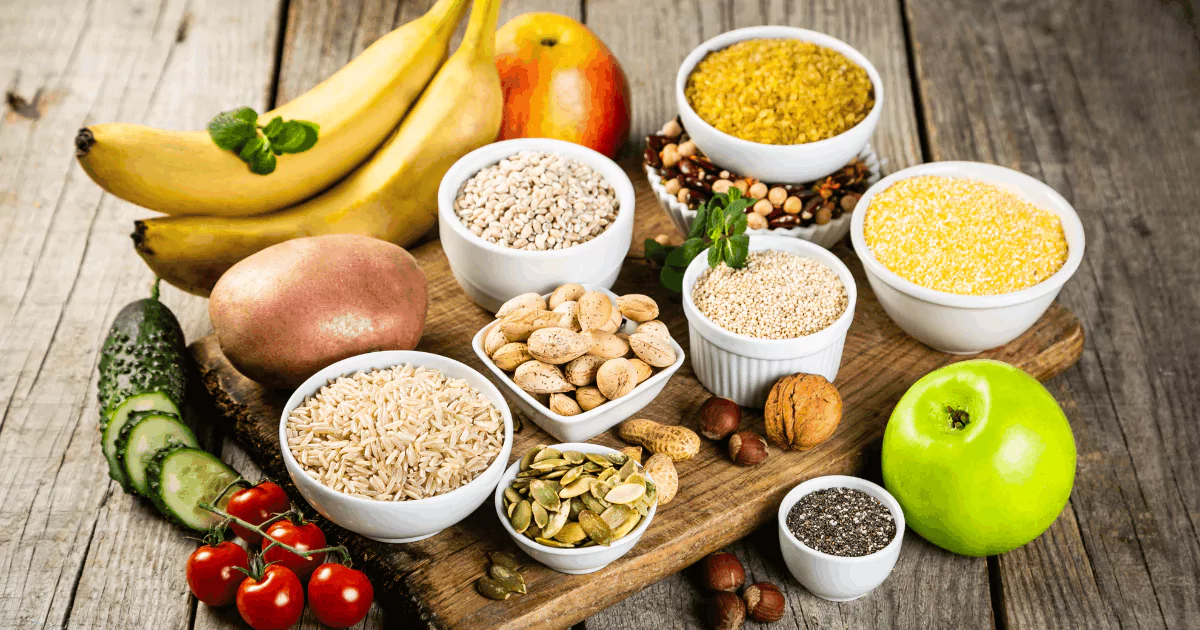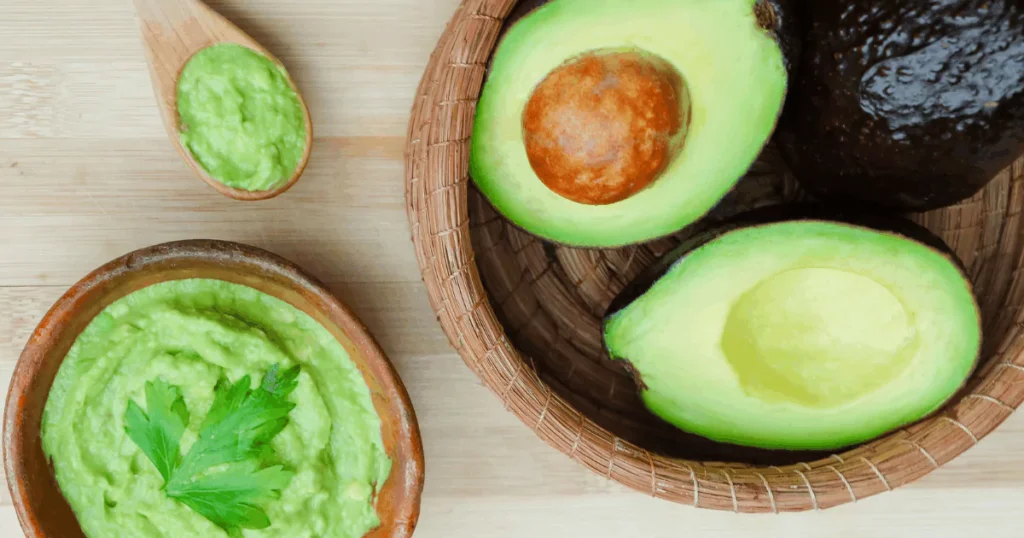A diet for hormonal imbalance can make a significant difference in maintaining your body’s natural balance. Start with foods rich in omega-3 fatty acids like salmon, chia seeds, and walnuts, which help reduce inflammation and support hormone production. Dark leafy greens, such as spinach and kale, are packed with magnesium, a key mineral for stress regulation and hormone balance. Adding cruciferous vegetables like broccoli and cauliflower helps the liver detoxify and regulate estrogen levels. Whole grains like oats and brown rice provide steady energy and stabilize blood sugar, preventing insulin spikes that can disrupt hormones.
Including nuts and seeds, such as flaxseeds and almonds, in your diet for hormonal imbalance can also regulate hormones by providing essential fatty acids and lignans. Avocados are another excellent choice, rich in healthy fats that support the body’s hormone production. Fermented foods like yogurt and sauerkraut improve gut health, which is essential for hormone regulation. Lastly, drinking plenty of water and reducing processed foods can support a balanced diet for hormonal imbalance.

Your Diet for Hormonal Imbalance Relief
When it comes to feeling our best, we often overlook how much of an impact our hormones have on our overall health. Hormones act like messengers in the body, sending important signals to help manage everything from energy levels and mood to sleep cycles and metabolism.
Leafy Greens
Leafy greens like spinach, kale, and Swiss chard are packed with essential nutrients that support hormone health. These greens are rich in magnesium, a mineral that is crucial for keeping cortisol (our stress hormone) levels in check. When cortisol levels spike, it can throw other hormones off balance, leading to feelings of anxiety and fatigue.
Imagine trying to hold an umbrella against a strong wind. Without enough strength, the umbrella flips, and you get soaked. In this analogy, magnesium provides the “strength” your body needs to handle stress without “flipping over” into a hormonal mess. Adding leafy greens to your diet can help your body stay steady, even when life feels chaotic.
Simple Ways to Add Leafy Greens:
- Toss them in a smoothie
- Add them to soups
- Sauté with olive oil and garlic for a quick side dish
Avocados
A diet for hormonal imbalance can play a major role in keeping hormones steady, and avocados are an excellent addition to this diet. Rich in healthy monounsaturated fats, avocados provide essential building blocks for hormones that the body needs. Unlike unhealthy fats, the fats in avocados support stable blood sugar levels, which is crucial for mood and stress management. When blood sugar spikes and drops quickly, it can lead to mood swings and increase stress, worsening hormonal imbalances. Imagine blood sugar levels as a roller coaster: constant ups and downs can exhaust you.

However, including avocados in a diet for hormonal imbalance helps smooth out those fluctuations, providing a steady track for your energy and mood. Eating avocados regularly can contribute to balanced blood sugar and overall hormonal health. By incorporating avocados into a diet for hormonal imbalance, you take a simple yet effective step toward better emotional and physical well-being.
How to Eat More Avocado:
- Spread on toast
- Slice into salads
- Blend into smoothies for a creamy texture
Nuts and Seeds
Nuts and seeds, especially flaxseeds, chia, and pumpkin seeds, contain omega-3 fatty acids, fiber, and essential minerals like zinc and selenium. These nutrients are essential for producing and balancing hormones, particularly estrogen and progesterone, vital for reproductive health.
Imagine your hormones as musicians in an orchestra; when they’re out of sync, the music sounds chaotic. Adding seeds to your diet can act like a conductor, helping each “instrument” (or hormone) stay on beat. Flaxseeds, for example, contain lignans, a compound that can help regulate estrogen levels. This can be particularly helpful for women experiencing PMS or menopause symptoms.
Simple Ideas for Adding Nuts and Seeds:
- Sprinkle flax or chia seeds on yogurt or oatmeal
- Enjoy a handful of mixed nuts as a snack
- Use pumpkin seeds as a crunchy topping for salads
Fermented Foods
Diet for Hormonal Imbalance plays a key role in maintaining overall health, especially for women who experience various hormonal changes. A diet rich in fermented foods, like yogurt, sauerkraut, and kimchi, can be incredibly beneficial due to their high probiotic content. These “good” bacteria promote a healthy gut, essential for balancing hormones. The gut and hormones are intricately connected through the “gut-brain” axis, meaning gut health directly impacts hormone levels.

When gut health is poor, it can throw hormones out of balance, affecting mood, energy, and metabolism. Just like plants need nutrient-rich soil to thrive, our bodies need a balanced “Diet for Hormonal Imbalance” to support healthy hormone production. Probiotics act like fertilizers, keeping the “soil” of the gut healthy and allowing hormones to function properly. Incorporating probiotics into a Diet for Hormonal Imbalance helps the body manage hormonal changes better, supporting physical and emotional well-being.
Easy Fermented Food Choices:
- Try yogurt or kefir with no added sugar
- Enjoy a side of sauerkraut or kimchi with meals
- Make a snack of miso soup
Fatty Fish
Fish like salmon, sardines, and mackerel are rich in omega-3 fatty acids, which have anti-inflammatory properties. Inflammation can disrupt hormone production and lead to imbalances. Omega-3s also help improve insulin sensitivity, making fatty fish a great option for people with blood sugar issues or conditions like PCOS (Polycystic Ovary Syndrome).
Think of omega-3s like the oil in a car engine. Without it, things start to grind and wear down. Adding fatty fish to your diet provides that necessary “oil,” allowing your hormones to work smoothly without unnecessary friction or stress.
Easy Ways to Eat More Fatty Fish:
- Grill salmon for a quick dinner
- Add sardines to a salad
- Snack on canned salmon or tuna with crackers
Berries
A balanced diet can play a powerful role in managing hormones, and including berries is a great start for anyone focusing on a Diet for Hormonal Imbalance. Berries like blueberries, strawberries, and raspberries are loaded with antioxidants, which protect your body from oxidative stress—a process that can disrupt hormone production. Think of oxidative stress like rust forming on metal. The antioxidants in berries act like polish, helping to remove the “rust” and keep your cells functioning well.
This “polish” effect ensures that your hormones stay balanced, supporting overall well-being. Additionally, berries have a low glycemic index, which means they won’t cause sharp spikes in blood sugar levels, an important factor in a Diet for Hormonal Imbalance. Stable blood sugar levels are crucial because they prevent insulin imbalances, which can throw off other hormones. By including these antioxidant-rich fruits in a Diet for Hormonal Imbalance, you’re nourishing your body with essential nutrients that promote smoother hormone regulation and a healthier, more balanced lifestyle.
Delicious Ways to Enjoy Berries:
- Add to smoothies or yogurt
- Top oatmeal or cereal with a handful of berries
- Enjoy them fresh as a sweet snack
Whole Grains
Whole grains such as oats, quinoa, and brown rice are high in fiber and help to keep blood sugar levels stable. Refined grains, like white bread or pastries, cause blood sugar spikes that can lead to insulin resistance over time. Since insulin is a hormone that controls blood sugar, a diet high in whole grains can help keep this process in check.
Picture whole grains as slow-burning fuel, like a log on a fire that keeps burning for hours, as opposed to sugar, which burns quickly and fades fast. Eating whole grains gives you steady energy and keeps your hormones on track without unnecessary highs and lows.
Simple Whole Grain Choices:
- Swap white rice for quinoa or brown rice
- Choose oatmeal for breakfast
- Try whole-grain pasta in your favorite dishes
Eggs
Eggs are one of nature’s most nutrient-dense foods. They are an excellent source of protein and healthy fats, both supporting hormone production. Eggs are also high in vitamin D, crucial for maintaining a balanced hormonal environment. Low vitamin D levels have been linked to issues like depression and fatigue, as well as hormonal imbalances.
Imagine your body like a factory, with each department relying on certain materials to get the job done. Eggs provide a “one-stop shop” of nutrients that help keep everything running smoothly. Plus, they’re versatile and can be prepared in countless ways, making them an easy addition to any diet.
Easy Egg Ideas:
- Make an omelet packed with veggies
- Boil eggs for a quick snack on the go
- Add a poached egg on top of toast or salad
Dark Chocolate
Good news for chocolate lovers! Dark chocolate, especially those with 70% cocoa or higher, contains magnesium and antioxidants that can lower cortisol and reduce stress. It’s also known to boost serotonin levels, which improves mood. While it’s a treat, dark chocolate can help support hormone balance when consumed in moderation.
Think of dark chocolate as a little “mood booster” that can support your hormonal health without guilt. Unlike sugary milk chocolate, dark chocolate is lower in sugar and packed with powerful compounds that promote relaxation.
Ways to Enjoy Dark Chocolate:
- Enjoy a small square after meals
- Add cacao powder to smoothies
- Mix dark chocolate pieces into trail mix
Final Thoughts
Diet for Hormonal Imbalance plays a crucial role in keeping our bodies in harmony. Hormones control everything from our energy levels to how well we sleep, and when they’re out of balance, it can feel as if our whole body is affected. Thankfully, making a few simple food choices can help. Including more leafy greens, fatty fish, and whole grains can support hormonal health.
These foods provide essential nutrients, helping the body regulate hormone production naturally. Diet for Hormonal Imbalance doesn’t have to be complicated; even small changes can make a big difference. By adding a variety of nutrient-rich foods, we give our bodies the tools they need to function optimally. Imagine each food as a puzzle piece, coming together to form a complete picture of better health. With a consistent Diet for Hormonal Imbalance, you’ll likely notice improved energy, better sleep, and a greater sense of well-being daily.

